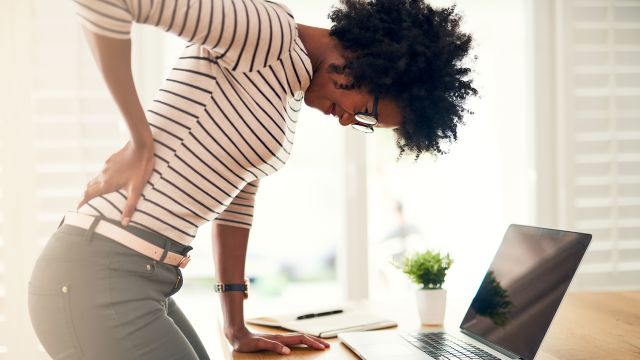Updated on December 1, 2023.
Back pain is a common problem, affecting 80 percent of people at some point in their lives. But not everyone's discomfort is the same and some signs and symptoms are more troubling than others.
Most cases of back pain are the result of strains, which occur when muscles or tendons in the back are overworked. Even small movements—like twisting or stretching too far, lifting something improperly, or trying to pick up an item that's too heavy—can result in a strain.
When tissues stretch or tear, it can cause a variety of symptoms from a dull ache to sharp pain to a burning sensation in the affected area. The discomfort can last anywhere from a few days to a few weeks. Acute pain from a strain will typically subside on its own. If need be, strains can also be managed with rest, ice, heat, and over-the-counter pain relievers such as acetaminophen, ibuprofen, or naproxen.
Back pain that's severe or that persists for several weeks, on the other hand, should be evaluated by a healthcare provider (HCP).
Wayne Kelley, MD, a spine surgeon with OrthoGeorgia in Macon, Georgia, notes that back pain that crops up with other symptoms also requires immediate attention. These warning signs may include bowel or bladder problems or progressive neurological changes, like sudden arm or leg pain with weakness, numbness, or tingling. When back pain begins with no discernible cause and doesn’t go away on its own, it could be linked to a serious spinal issue.
Read on to understand which types of back pain and related symptoms may indicate serious conditions that require medical attention.
Leg pain and weakness
Pain that originates in the lower back and travels down the legs—also known as sciatica—may signal a serious problem. Underlying causes may include a herniated disk or spinal stenosis, according to Dr. Kelley. Both conditions cause the space around the spinal nerves to narrow, which may result in nerve pain and irritation.
Like back pain, pain through the back of your legs may be dull or severe and can come in bursts, worsened by coughing or sneezing. Discomfort caused by a herniated disk typically travels down one side of the body. Pain from spinal stenosis typically affects both legs, sometimes in their entirety. It tends to worsen with standing and walking and often eases with sitting down and bending forward.
Most pain caused by sciatica or a herniated disk will improve within six to eight weeks without surgery. But if pain in the arms or legs lasts longer than a week, becomes severe, or is accompanied by muscle weakness or difficulty controlling your bowels or bladder, seek immediate medical attention. Your HCP will diagnose the condition with a physical exam and may recommend imaging tests including X-rays or an MRI.
Depending on the cause of the pain, your HCP may prescribe ice or heat, over-the-counter pain medications, exercise, physical therapy, or steroid injections. In some cases, surgery may be warranted.
Loss of bladder or bowel control
“When you can’t empty your bladder or you can’t go to the bathroom, those are urgent things that require immediate medical attention,” Kelley says.
Bladder or bowel incontinence may be signs of nerve compression caused by a ruptured disk. If left untreated, nerve compression can lead to permanent nerve damage.
Stiffness in the morning
It’s not always easy to get out of bed, but excessive morning back pain and stiffness could be a sign of spinal arthritis. Most types of arthritis—including osteoarthritis and rheumatoid arthritis—cause pain and stiffness that worsens toward the end of the day and after periods of rest, like a night’s sleep.
Any part of the spine can become arthritic, but the lower back (lumbar region), is most commonly affected. Untreated spinal arthritis can lead to excruciating pain and stiffness and a decreased range of motion. Thankfully, there are ways to manage the condition. Once diagnosed using a physical exam and X-ray imaging, spinal arthritis can be treated with pain medication and physical therapy. Surgery is needed in rare cases.
Protect yourself before it's too late. Getting regular exercise, maintaining a healthy body weight, practicing good posture and doing your best to avoid spinal injury all decrease your risk for spinal arthritis and other back-related issues.







